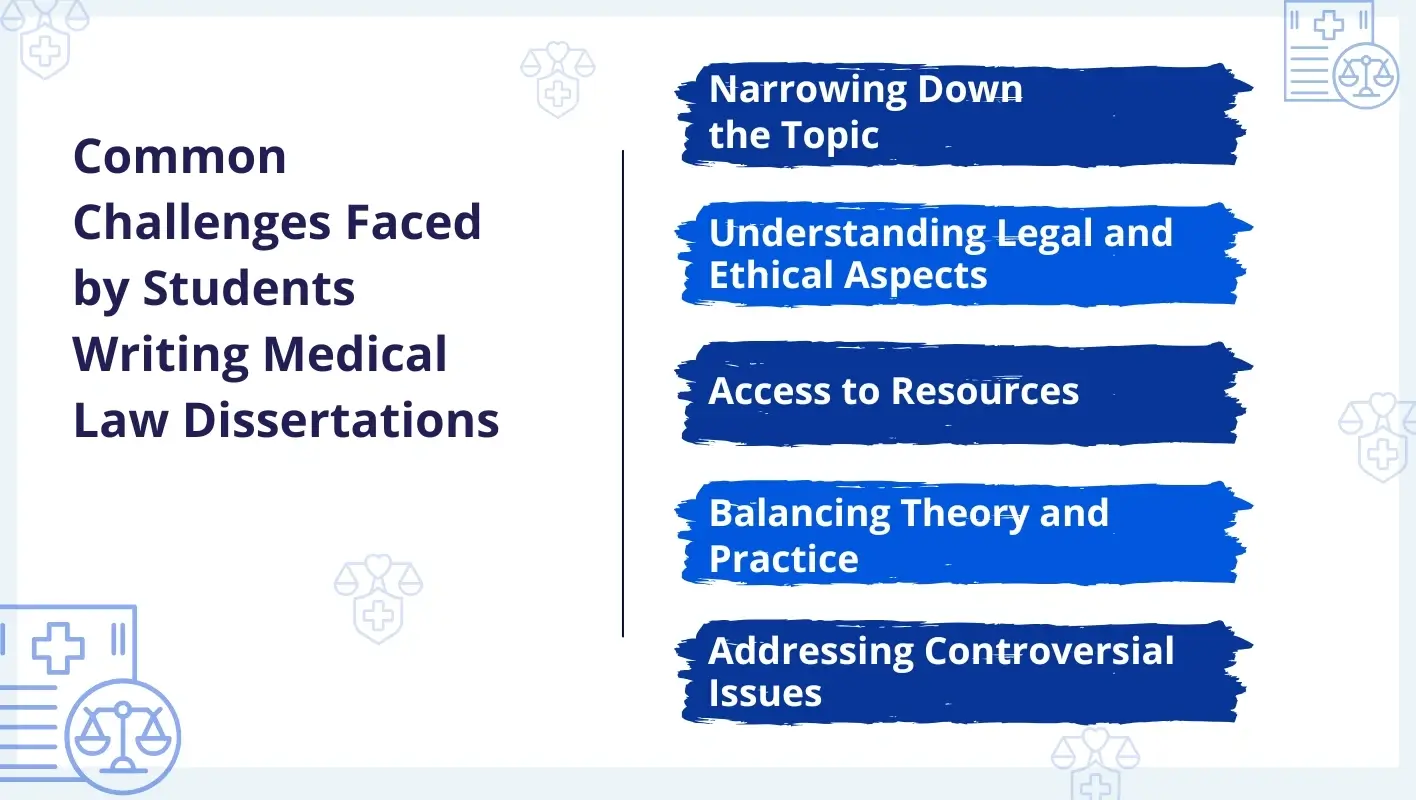
Medical law is a sub-discipline of law that deals with legal issues arising from medical practice, professionalism, and the code of ethics that is expected to be met by everyone. This branch of law covers a broad sector of legal concerns in the practice of medicine and healthcare, protection of patients' rights, healthcare policies, ethical issues, and governance of healthcare practitioners.
This is more so the case in modern society and future societies, as medical laws, new technologies, and medical progress present new legal and ethical issues. As such, a medical law dissertation enables students to explore these issues and serves as a ground and basis for practices of law in healthcare. However, everyday issues that students encounter when selecting the dissertation and writing down the topic. This blog looks at medical law, challenges students can experience, and natural and fictional medical law dissertation topics for 2025.
Medical law is a general term that is applied to the rules and laws that administer medical practice and health care services. It covers a broad area of law, including patient's rights, medical negligence, principles of health care, the law of confidentiality, and the authority over health care facilities and practitioners. In most instances, medical laws and ethics dissertation topics deal with the human rights of those seeking treatment or care and their legal rights being protected by law.
A dissertation on medical law needs to be well-researched and well-analyzed as it deals with the legal principles and ethical issues in medical conditions. Many students face challenges in these areas, such as:
Also read: Trending Topics For 2025 To Ace Your Law Assignment

Narrowing Down the Topic: Given the field's expansiveness and the advanced legal concerns students encounter, they need help to select proper dissertation topics. Due to the constraints in the word limit, it is required to concentrate on a definite aspect of the law to make a thorough examination.
Understanding Legal and Ethical Aspects: Some medical law topics are legal, ethical, and sometimes medical issues as well. Students may always feel challenged when and how to incorporate all these aspects in their dissertation.
Access to Resources: Medical law has been an emerging discipline, and students require up-to-date case reports, statutes, and articles. Sometimes, it can be a problem to get the necessary resources and information updated.
Balance Theory and Practice: Since students are in class and have no first-hand experience, practical application is a challenge they need help to overcome.
Addressing Controversial Issues: Most of the medical law subjects raise contentious questions, for example, on euthanasia or abortion. These topics require students to be politically correct and demonstrate academic treatise while proposing their opinions on the subject, including pros and cons.
While selecting medical law dissertation topics, there are a few points one should consider, such as interest, current trends in the legal field and the perspective of the student. The topics below are applicable to your interest, and it encompass legal concerns or great existing debates in the area.
Now, the following are 20 unique dissertation topics for 2025 concerning possible issues and questions in medical law. These topics provide a good mix of timeliness and specificity, which will likely help meet as many potential research needs as possible.
Choosing the appropriate medical law dissertation topic is one of the most important steps to follow while writing an academic paper. The choice of a topic is perfect as it not only represents the primary interest of the author but also enables the student to contribute to the ongoing discussion regarding topical questions concerning the development of medical law.
Selecting a topic that fits the criteria of the study and is also realistic to research takes more work. Here are those practical tips that will help you to decide on the more appropriate topic for your dissertation.
Identify Your Area of Interest: Select your areas of interest in medical law, which can be patient rights, medical negligence, or health care laws. Public interest in your topic is vital since it will help you work tirelessly while developing your research.
Consider Current Trends: Select a topic that focuses on challenges or recent trends in medical laws and ethics, for instance, the application of Artificial Intelligence in medical practices or genetic engineering.
Evaluate the Scope: It is essential to see that the topic needs to be more generalized and specific. A clear and specific issue can be discussed to the maximum extent allowed by the number of words.
Assess Available Resources: Make sure that there are enough case laws, statutes, and writings that can be used in the study.
Consult Your Supervisor: Consult your academic advisor to help you narrow down your chosen topic and ensure compliance with educational standards.
Selecting medical law dissertation topics depends on the existing trends and issues, existing legalities, and the individual's area of interest. By exploring unique dissertation topics, students can contribute to the ongoing dialogue about the intersection of law, medicine, and ethics.
Regardless of whether these topics relate to bioethics, patient rights, or new technologies, these topics will enable students to study medical law issues that define healthcare systems globally. The clarifications of these laws remain fluid and require students to keep up-to-date with the changes in these laws while making sure that the focus of their dissertations is relevant to the topical legal and ethical questions of today.
At Quick Assignment Hub, we understand the struggles students go through whenever they are selecting their ideal dissertation topic. You can rely on us to help you choose suitable medical law dissertation topics that will enable you to achieve your academic objectives in this exciting and vital area of study.